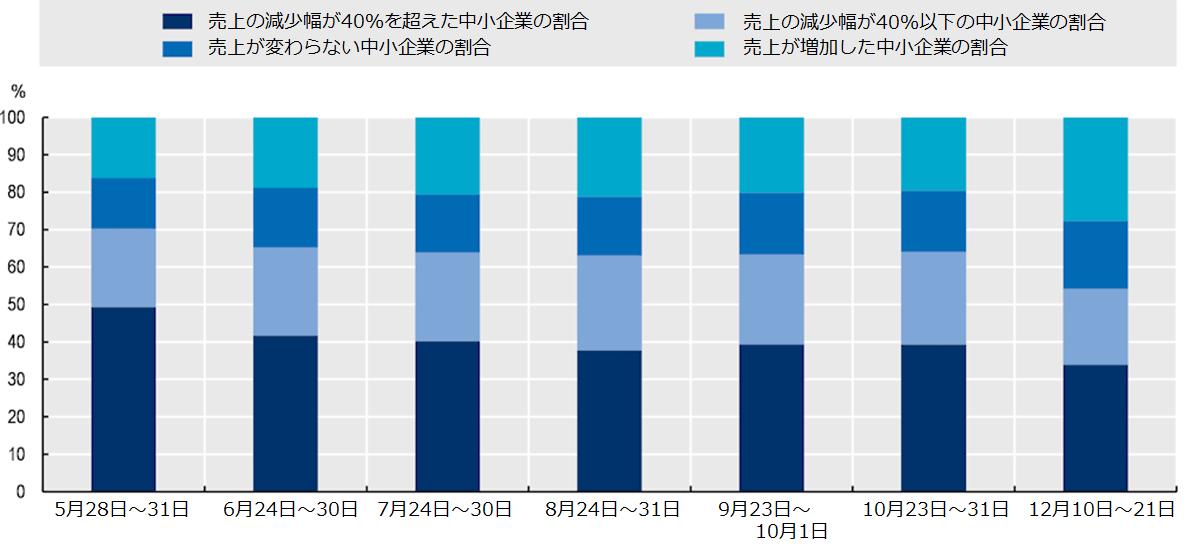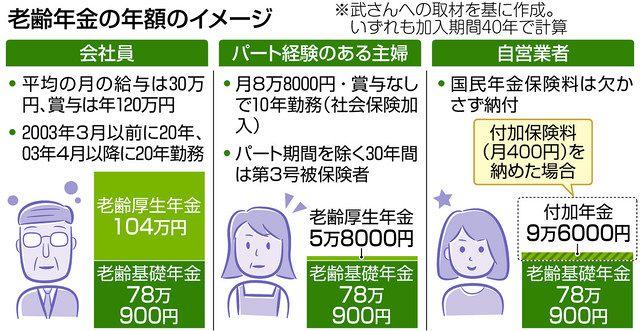In June 2021, the OECD (Organization for Economic Co-operation and Development) released the OECD SME and Entrepreneurship Outlook 2021. In this report, the OECD considers the policy support provided by governments to SMEs and entrepreneurs, and will continue to provide additional support as SMEs continue to struggle during the recovery period from the pandemic. points out that it is necessary. Below is an overview of the report.
Impact of the Corona Crisis on SMEs and Entrepreneurs
Although all companies and industries were directly or indirectly affected by the COVID-19 crisis, SMEs were particularly hard hit. rice field. SMEs in industries most affected by lockdown measures (such as food and lodging, transportation and other services) have often had to close their operations. According to the results of a joint survey by Facebook, the OECD, and the World Bank (hereinafter abbreviated as "joint survey"), the percentage of SMEs that closed from May to December 2020 technology) was about 8 points higher than industry.
Many of the SMEs that were able to continue their business faced serious liquidity (cash) shortages as a result of a significant drop in revenue. The results of the joint survey show that between 55% and 70% of SMEs experienced a year-on-year decline in sales at each point in the study, and two-thirds experienced a decline of more than 40%. (Figure).
Figure: Sales increase/decrease of SMEs with Facebook pages (compared to the same month of the previous year) Click image to enlarge
Moreover, despite the easing of lockdown measures in many countries during this period, the situation of SMEs has improved only marginally. By industry, the percentage of SMEs whose sales declined from May to October 2020 on average across OECD countries was approximately 15 percentage points higher in the food and accommodation industry than in the ICT industry and 25 percentage points higher than in agriculture. .
On the other hand, in most of the 16 OECD countries for which data are available, the number of new businesses in the second or third quarter of 2020 declined significantly year-on-year, but the opposite trend was observed in Japan, Sweden, and the United States. was taken. However, since then, the number of startups in most countries has recovered, and only Southern European countries such as Italy and Spain and Poland saw a year-on-year decrease in the number of startups in 2020. By industry, food and lodging, real estate, and arts and entertainment saw a significant decline in almost all countries. Manufacturing and construction, on the other hand, saw faster recoveries in many countries.
The impact on self-employed people and specific entrepreneurs is remarkable
The impact of the pandemic on self-employed people and specific entrepreneurs is more serious than on large companies and employees was. According to a study by the European Foundation for Better Living and Working Conditions (Eurofound), the proportion of those who lost their jobs during the pandemic was 13% for self-employed people without employees, compared with 8% for employees and self-employed people. It was higher than the sales person (2.3%). However, a significant proportion (5.9%) of those self-employed with employees laid off their workers and became self-employed without employees. In addition, the proportion of those who had their working hours reduced was higher for self-employed people without employees (53%) and for self-employed people with employees (51%) than for employees (27%).
In OECD countries, entrepreneurs such as women and minorities have been hit harder. This may reflect problems with access to finance, the industry in which they operate, and the increased burden of household chores on women during the corona crisis. For example, between February and June 2020, the number of female business owners in the United States decreased by 10%, while the number of male business owners decreased by 7%. Also, the total number of business owners in the country decreased by 22% from February to April 2020, while business owners of color, such as African Americans, Latinos and Asian Americans, each had 41. %, 32% and 26%.
Policy support for SMEs and entrepreneurs has been effective
Government responses have been swift and strong, and have been effective in softening the initial blow of the corona crisis. . The scale of the emergency package is unprecedented and includes a range of supportive measures including subsidies, deferrals, loans and loan guarantees to help small businesses and entrepreneurs survive. In most OECD countries, 20-40% of SMEs received some form of government support in 2020. SMEs in industries most affected by lockdown measures, and those whose sales have declined significantly, were more likely to receive government support in 2020. According to the results of the joint survey, SMEs in the restaurant and accommodation industry were about 20 percentage points more likely to receive government support than SMEs in the ICT industry. SMEs whose sales fell more than 40% year-on-year were about 15 percentage points more likely to receive government support than those whose sales were the same or higher than the previous year.
Statistics to early 2021 in countries where data is available show no significant increase in bankruptcies so far. This is largely related to government support measures, including temporary regulations on bankruptcies. However, as debt piles up among SMEs and government support measures are lifted in the future, the number of bankruptcies will rise significantly, which could have long-term effects on the economy. Governments need to implement policies to address this problem, such as timely debt restructuring of viable firms and implementation of efficient liquidation procedures in which resources are reallocated from non-viable firms. .
Digitalization has accelerated, but problems such as security risks also exist
About 50% of SMEs increased their use of digital technologies and platforms during the pandemic. Even in industries hit hard by lockdown measures, small businesses that sell online are far outperforming those that don't. Joint survey results show that small businesses selling more than 75% of their products online experienced a decline in sales from May to October 2020 compared to small businesses selling less than 25% of their products online. is about 15 points lower.
The accelerated adoption of digital tools among SMEs may help close long-standing productivity gaps. However, accelerating digitization has exposed SMEs and entrepreneurs' vulnerability to digital security risks, intensifying attacks on SMEs that are ill-equipped to respond to sophisticated cyberattacks. In addition, the self-employed and micro-enterprises (with 1-9 employees) in particular have lagged behind in digitization. The gap is widening further. Solutions and policies to address investment gaps, efforts to improve digital skills and data culture of SMEs, and digital security are needed for all businesses to fully exploit the transformative potential of digital tools. .
Many SMEs express need for additional support

Government support is less effective for self-employed people, women and minority entrepreneurs, and small and young SMEs, exacerbating existing inequalities. According to a joint survey, in the 32 OECD member countries, 33% of SMEs in the first to second year of establishment received government support in 2020, compared to 39% of SMEs in the third to fourth year of establishment. , 45% of SMEs established more than 5 years ago. Newly established businesses received even lower rates of support, with only 15% of SMEs starting operations in 2020. Micro enterprises and the self-employed were also supported by 38% and 29% respectively, compared to 58% for other SMEs.
In addition, the proportion of SMEs receiving government support varies greatly from country to country, reflecting institutional settings, effectiveness of delivery mechanisms, and financial capacity. Direct government spending on the private sector as a percentage of GDP ranges from 0.6% (Mexico) to 14.7% (USA) to 18.6% (New Zealand). In addition, some countries invest in large credit guarantee schemes, with Germany and the United Kingdom contributing up to 25% and 16% of GDP, respectively.
SMEs continue to struggle during the pandemic and its recovery phase. According to a joint survey, as of December 2020, 42-96% of SMEs in 32 OECD member countries expressed the need for additional support in the future. Companies operating in countries with stricter containment measures are likely to need more government support.







![Advantages of "Gravio" that can implement face / person recognition AI with no code [Archive distribution now]](https://website-google-hk.oss-cn-hongkong.aliyuncs.com/drawing/article_results_6/2022/2/25/98ceaf1a66144152b81298720929e8e7.jpeg)